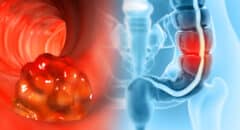
Colon cancer is evolving. Once seen primarily as a disease affecting older adults, recent trends show that it now strikes younger individuals and often at more advanced stages. With early detection playing a crucial role in improving outcomes, patients must have informed discussions with their healthcare providers.
Quick Facts: The Current Burden of Colon Cancer
-
-
- More than 153,000 new CRC cases in the US
- Among those younger than 50: Almost 20,000 new cases
-
-
Rectal Cancer Specifics:
-
-
- In patients under 50, 37% of CRC cases occur in the rectum (compared to 24% in those aged 65 or older)
- In patients under 50, 37% of CRC cases occur in the rectum (compared to 24% in those aged 65 or older)
-
-
Sex Disparities:
-
- CRC incidence is 33% higher in men (41.5 per 100,000) than in women (31.2 per 100,000) during 2015–2019
The Changing Landscape of Colon Cancer
Rising Incidence in Younger Populations
Recent studies indicate a steady annual increase of about 3% in CRC cases among individuals under 50. To put this in perspective:
- Children (10–14 years): 500% increase
- Teenagers (15–19 years): 330% increase
- Young Adults (20–24 years): 185% increase
In addition, the overall shift toward later-stage diagnosis is alarming. The proportion of cases diagnosed at regional or distant stages rose from 52% in the mid-2000s to 60% in 2019.
RELATED: Colon Cancer Symptoms: Are Black Americans Facing a Silent Crisis?
Screening Gaps and Barriers
Current Guidelines vs. Reality:
- Guideline Limitation:
Screening is typically recommended for ages 45 to 75. - Impact on Younger Patients:
When younger patients get colonoscopies, these tests are often classified as “diagnostic” rather than “screening.” This means:- They may face higher out-of-pocket costs.
- Early detection opportunities can be delayed.

Global Insights
International data from 50 countries showed significant variation in early-onset CRC incidence:
- Higher Rates: Australia (16.5 per 100,000), USA (14.8), New Zealand (14.8), South Korea (14.3)
- Lower Rates: Uganda (4.4), India (3.5)
Moreover, in many regions, the rise was either confined to younger adults or is increasing faster among them compared to older adults.
RELATED: Know Your Risk: 10 Things Blacks Need to Know About Colon Cancer Symptoms
5 Life-Saving Questions You Should Ask Your Doctor
Owing to the current situation and the increasing number of cases among young adults, health experts from Vanswefitness have compiled a list of the top 5 questions that you must not forget to ask your doctor that will help you steer clear from the claws of Colon Cancer.
1. “Based on my family history and personal risk factors, should I start colon cancer screening earlier than the standard age?”
Tailored screening is vital when you have a family history or other risk factors. With rising early-onset CRC rates and advanced-stage diagnoses in younger people, understanding your personal risk could mean beginning screening sooner than the standard recommendation.
2. “What are the most effective and accessible screening options for someone like me?”
While colonoscopies are the gold standard, they aren’t always accessible for younger patients, especially when performed before the recommended age, as they’re often billed as diagnostic tests. Ask about alternative screening methods such as:
-
- Stool-based tests (e.g., FIT or HSgFOBT):
- Low cost
- Noninvasive
- Can be performed at home
- Stool-based tests (e.g., FIT or HSgFOBT):
- Virtual Colonoscopy:
-
- Low Dose CT
- Looks for Polyps inside the Colon
These options may help in detecting colon cancer early without the financial or logistical barriers associated with colonoscopies.
3. “What symptoms should I look out for, and how can I tell if they might indicate colon cancer?”
Early symptoms can be subtle or mistaken for less serious issues. Common warning signs include:
- Abdominal pain
- Rectal bleeding
- Diarrhea
- Signs of iron deficiency
Being aware of these symptoms is particularly crucial since many younger patients are diagnosed at more advanced stages.
4. “How do lifestyle factors such as diet, exercise, and body weight affect my colon cancer risk?”
Modern lifestyles have shifted toward more sedentary habits and dietary changes, contributing to the rising incidence of colon cancer. Discussing these factors can help you understand your risk and adopt preventive measures. Consider asking about:
- Dietary recommendations
- Exercise routines
- Weight management strategies
5. “What distinguishes early-onset colon cancer from the cases typically seen in older adults, and what does this mean for my health?”
Studies reveal that colon cancer in younger individuals not only is on the rise but is also frequently diagnosed at a later stage. Key differences include:
- Stage at Diagnosis:
- Younger patients are more likely to be diagnosed when the disease is advanced.
- Tumor Location:
- A higher proportion of younger patients have rectal cancer (37% under 50 vs. 24% in those 65 or older).
- Sex Disparities:
- Men have a 33% higher incidence rate than women.
Understanding these distinctions can empower you to engage in proactive screening and risk management tailored to your profile.
Conclusion
The landscape of colon cancer is shifting rapidly, especially among younger individuals. A significant burden among those under 50 with about 20,000, early detection is more critical than ever. The data also reveal unique trends in rectal cancer and sex-based disparities that further emphasize the need for informed discussions with your doctor.
By asking these five life-saving questions, you can ensure that your screening and risk management are aligned with current trends and your personal health profile. Early detection is the cornerstone of improving outcomes, and your proactive approach can be the first step toward a healthier future.









